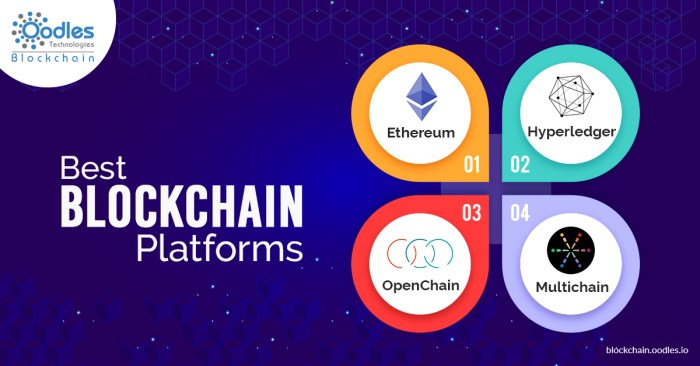In the realm of blockchain technology, selecting the optimal platform is crucial. Best Blockchain Platforms provides a comprehensive guide to the most prominent solutions, empowering you to make informed decisions. With an in-depth exploration of key characteristics, evaluation criteria, and emerging trends, this guide equips you with the knowledge to harness the transformative power of blockchain.
The rapid evolution of blockchain technology has given rise to a plethora of platforms, each boasting unique strengths and applications. Best Blockchain Platforms unravels the intricacies of these platforms, enabling you to identify the ideal solution for your specific requirements. Whether you’re a developer seeking to build decentralized applications or an enterprise seeking to leverage blockchain’s transformative capabilities, this guide serves as an invaluable resource.
With the rapid advancement of blockchain technology, businesses are exploring the best blockchain platforms to meet their needs. However, it’s crucial to stay abreast of emerging market trends. Explore our comprehensive guide on Forex Market Trends: Unraveling Market Dynamics and Trading Strategies to gain insights into market dynamics and effective trading strategies.

This knowledge will empower you to make informed decisions regarding blockchain platform selection and ensure your business remains competitive in the ever-evolving digital landscape.
1. Blockchain Platform Overview
Blockchain technology has emerged as a revolutionary force, transforming the way we interact with data and conduct transactions. Blockchain platforms provide the infrastructure upon which decentralized applications (dApps) and smart contracts are built.
In the realm of blockchain technology, the emergence of various platforms has sparked interest in the field. While each platform offers unique features, Bitcoin stands out as a pioneer in the concept of digital cash.
As described in the insightful article Bitcoin as digital cash , the cryptocurrency has revolutionized the financial landscape, paving the way for decentralized transactions and alternative forms of currency.
The interplay between blockchain platforms and digital cash showcases the transformative potential of this technology, opening doors to innovative applications and reshaping the way we interact with financial systems.
Blockchain platforms are characterized by their decentralized nature, ensuring data integrity and security. They offer key benefits such as transparency, immutability, and traceability, making them suitable for a wide range of applications across industries.
Key Characteristics of Blockchain Platforms
- Decentralization: Data is distributed across a network of nodes, eliminating the need for a central authority.
- Immutability: Once data is added to the blockchain, it becomes extremely difficult to alter or remove, ensuring data integrity.
- Transparency: All transactions are recorded on the public ledger, providing visibility and accountability.
- Security: Blockchain platforms employ robust cryptographic mechanisms to protect data from unauthorized access and manipulation.
- Efficiency: Smart contracts automate processes, reducing the need for manual intervention and increasing efficiency.
2. Evaluation Criteria for Blockchain Platforms
Selecting the right blockchain platform is crucial for the success of any dApp or blockchain-based solution. There are several key factors to consider when evaluating blockchain platforms:
Factors to Consider
- Performance: Assess the platform’s transaction throughput, latency, and scalability to meet application requirements.
- Security: Evaluate the platform’s security measures, including cryptographic algorithms, consensus mechanisms, and protection against cyber threats.
- Scalability: Consider the platform’s ability to handle increasing transaction volumes and network growth without compromising performance.
- User-friendliness: Determine the platform’s ease of use, development tools, and support for developers.
- Ecosystem: Assess the size and maturity of the platform’s community, including developers, users, and partners.
3. Popular Blockchain Platforms
Numerous blockchain platforms have emerged in the market, each with its unique features and strengths:
Prominent Blockchain Platforms
- Ethereum: A leading platform for smart contracts and dApp development, known for its vibrant ecosystem and programming flexibility.
- Bitcoin: The original blockchain platform, primarily used as a cryptocurrency but also supports smart contracts through the Lightning Network.
- Hyperledger Fabric: A permissioned blockchain platform designed for enterprise use cases, offering privacy and scalability features.
- Tezos: A blockchain platform with a strong focus on governance and self-amendment capabilities, enabling the community to upgrade the platform without hard forks.
- Polkadot: A multichain platform that allows for interoperability between different blockchains, creating a more connected blockchain ecosystem.
4. Emerging Trends in Blockchain Platforms
The blockchain industry is constantly evolving, with new advancements and trends shaping the future of the technology:
Emerging Trends
- Cross-Chain Interoperability: Platforms are exploring ways to enable seamless communication and asset transfer between different blockchains.
- Layer-2 Solutions: Off-chain scaling solutions are being developed to improve transaction throughput and reduce gas fees.
- Decentralized Finance (DeFi): Blockchain platforms are enabling the creation of decentralized financial applications, such as lending, borrowing, and trading.
- Blockchain as a Service (BaaS): Cloud providers are offering managed blockchain services, making it easier for enterprises to adopt the technology.
- Sustainability: Platforms are exploring eco-friendly consensus mechanisms and energy-efficient designs to reduce their environmental impact.
5. Case Studies and Best Practices
Successful blockchain implementations provide valuable insights into the practical applications of the technology:
Case Studies, Best blockchain platforms
- Supply Chain Management: Blockchain platforms are used to track and trace goods throughout the supply chain, ensuring transparency and reducing fraud.
- Healthcare: Blockchain platforms provide secure and efficient ways to manage patient records, streamline insurance claims, and enhance data sharing.
- Finance: Blockchain platforms enable faster and cheaper cross-border payments, streamline trade finance processes, and facilitate the creation of new financial instruments.
Best Practices
- Define Clear Objectives: Identify the specific problems that blockchain can solve for your application.
- Choose the Right Platform: Evaluate different platforms based on the factors discussed earlier to find the best fit for your needs.
- Design for Scalability: Implement mechanisms to handle increasing transaction volumes and network growth.
- Ensure Security: Use robust cryptographic algorithms, consensus mechanisms, and security protocols to protect your data and applications.
- Monitor and Maintain: Continuously monitor your blockchain implementation and make necessary updates to ensure optimal performance and security.
6. Industry Use Cases for Blockchain
Blockchain technology has the potential to transform a wide range of industries:
Industry Use Cases
- Supply Chain: Enhancing transparency, traceability, and efficiency in the movement of goods.
- Finance: Enabling faster and cheaper cross-border payments, streamlining trade finance, and creating new financial instruments.
- Healthcare: Securing patient records, streamlining insurance claims, and facilitating data sharing among healthcare providers.
- Government: Improving transparency and accountability in public services, such as voting, land registry, and identity management.
- Media and Entertainment: Protecting intellectual property, managing digital rights, and creating new revenue streams for content creators.
7. Design Considerations for Blockchain Applications: Best Blockchain Platforms
Building effective blockchain applications requires careful consideration of architectural principles and design patterns:
Architectural Principles
- Decentralization: Distribute data and processing across a network of nodes to eliminate central points of failure.
- Immutability: Design mechanisms to ensure that data once recorded cannot be altered or removed.
- Transparency: Make all transactions visible on the public ledger, providing accountability and auditability.
- Security: Implement robust cryptographic algorithms, consensus mechanisms, and security protocols to protect data and applications.
- Scalability: Design for high transaction throughput and network growth without compromising performance.
8. Security Considerations for Blockchain Platforms
Ensuring the security of blockchain platforms is crucial for the adoption and success of the technology:
Security Considerations
- Cryptographic Algorithms: Use strong encryption algorithms to protect data and transactions.
- Consensus Mechanisms: Implement robust consensus mechanisms to prevent malicious actors from manipulating the blockchain.
- Smart Contract Security: Ensure that smart contracts are thoroughly tested and audited to prevent vulnerabilities and exploits.
- Network Security: Protect the blockchain network from cyber attacks, such as DDoS and phishing.
- Key Management: Implement secure key management practices to protect private keys and prevent unauthorized access.
Final Review
As the blockchain landscape continues to evolve, Best Blockchain Platforms remains your trusted source for the latest advancements and best practices. Stay informed about emerging trends, security considerations, and industry use cases to stay ahead of the curve.
By embracing the insights and guidance provided within this guide, you can harness the full potential of blockchain technology, unlocking new possibilities for innovation and growth.
Top FAQs
What are the key characteristics of a robust blockchain platform?
When evaluating the best blockchain platforms for NFTs, it’s crucial to consider the advantages and disadvantages of different networks. For instance, in the comparison of Solana vs Ethereum for NFTs ( Solana vs Ethereum for NFTs ),
Solana offers faster transaction speeds and lower fees, while Ethereum provides a more established ecosystem and wider community support.
Ultimately, the choice between these platforms depends on the specific requirements and preferences of the NFT project.
Decentralization, immutability, transparency, security, and scalability are essential attributes of a reliable blockchain platform.
How do I evaluate different blockchain platforms?
Consider factors such as performance, scalability, security, user-friendliness, and the platform’s alignment with your specific requirements.
What are some of the most popular blockchain platforms?
Ethereum, Bitcoin, Hyperledger Fabric, EOS, and Tezos are among the most widely adopted blockchain platforms.




